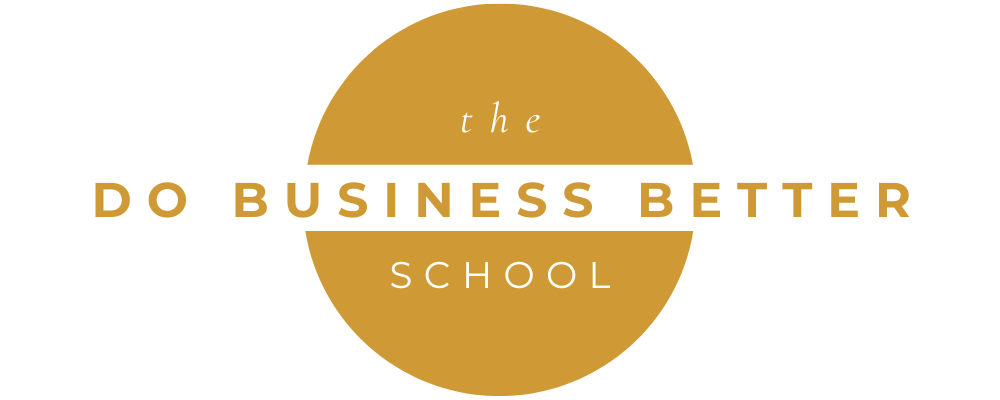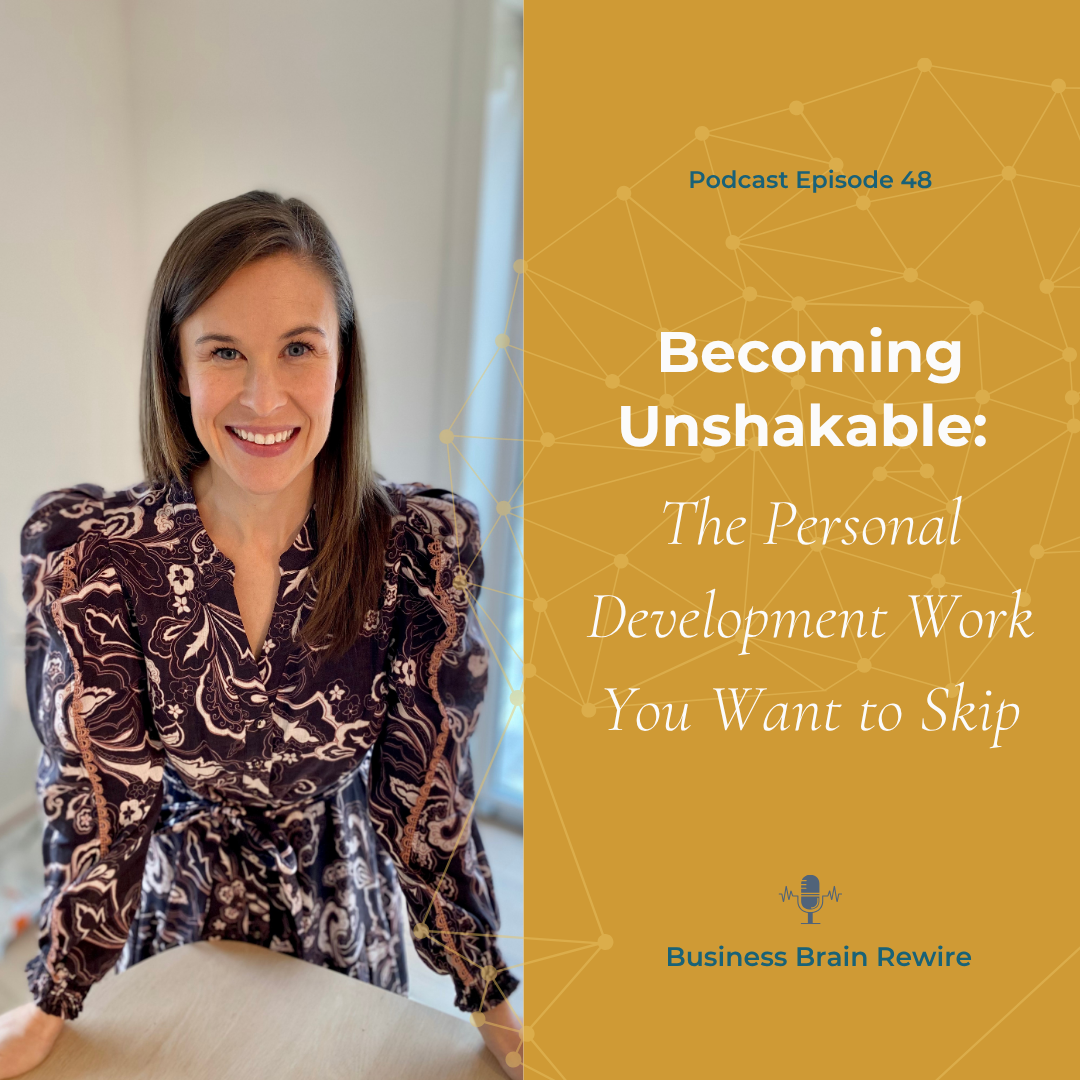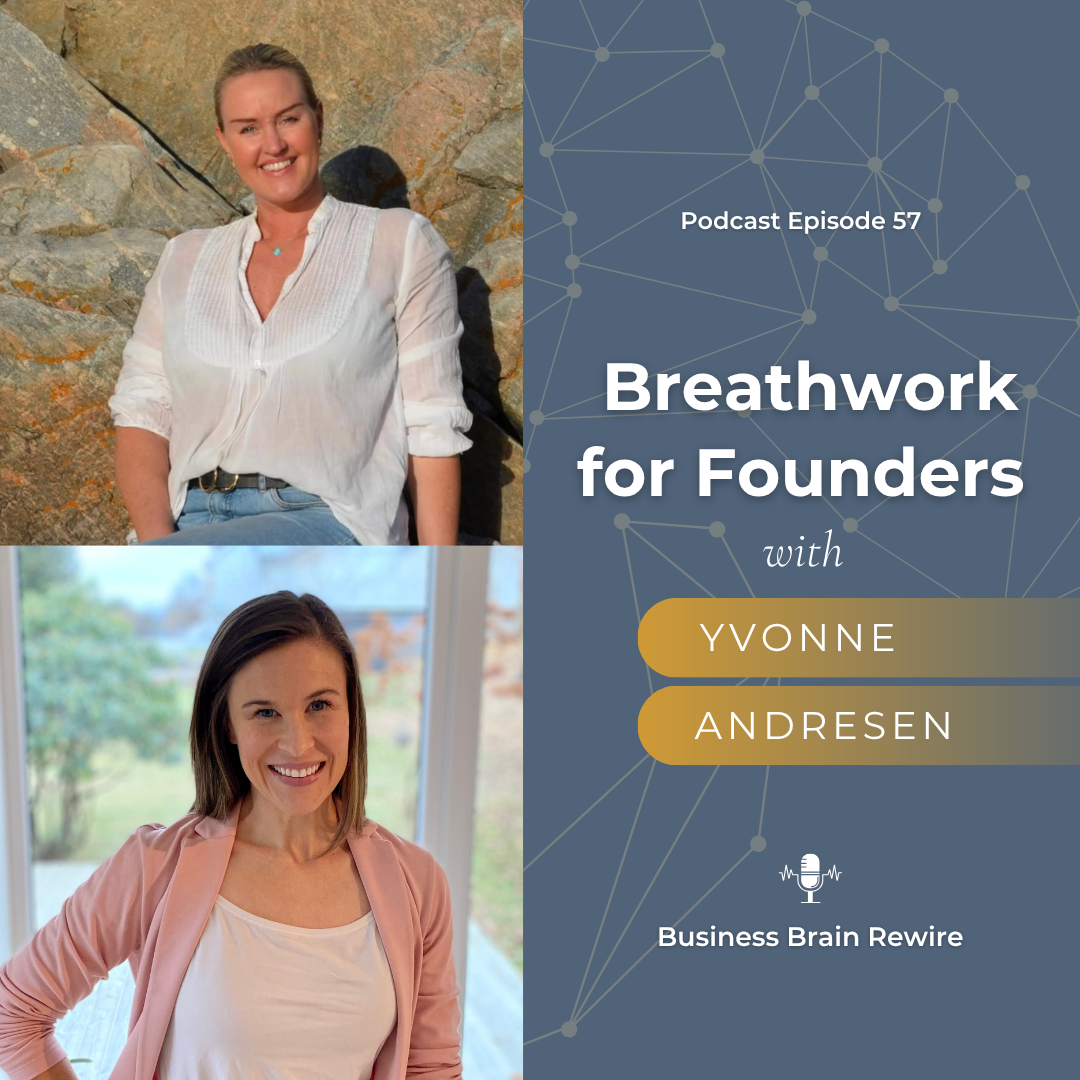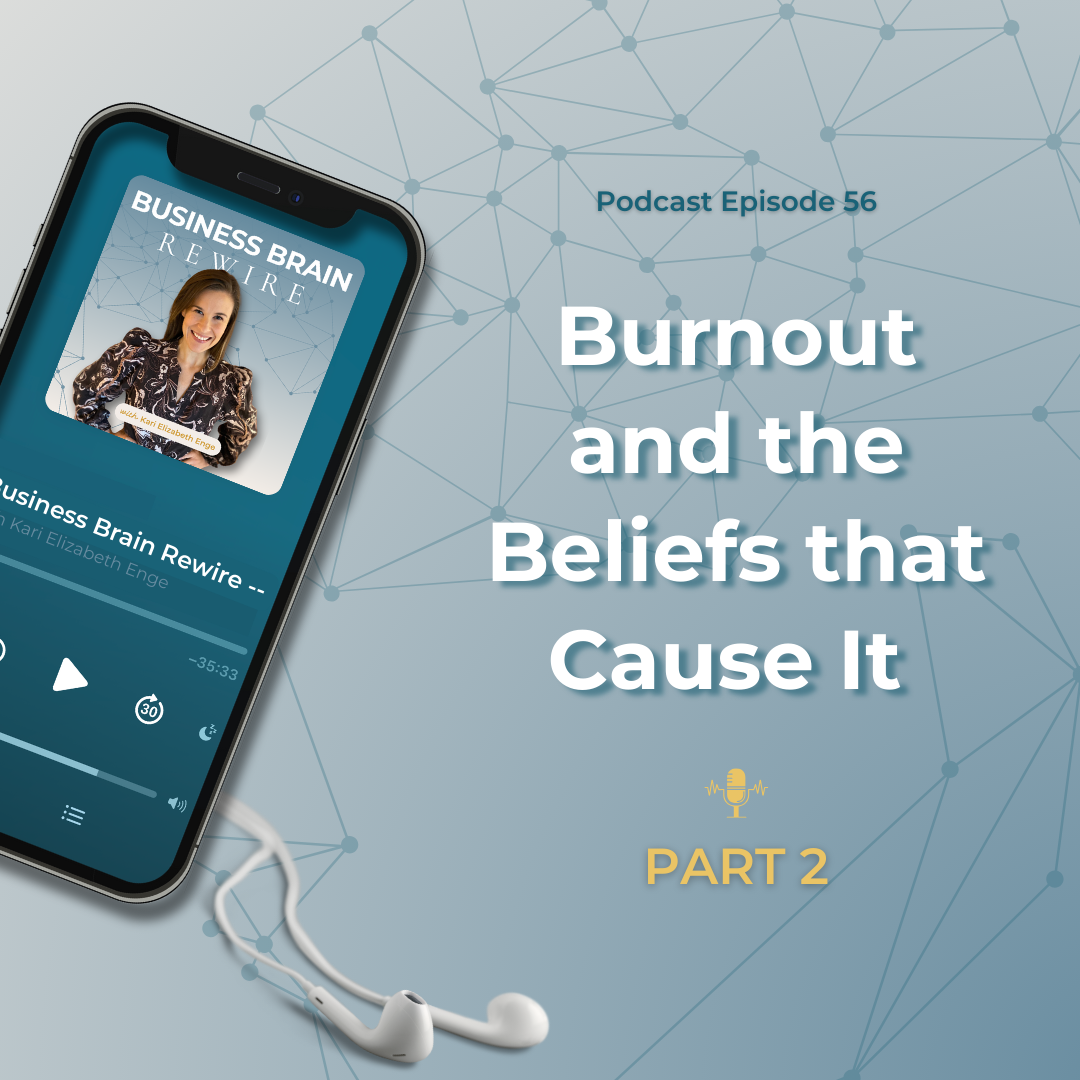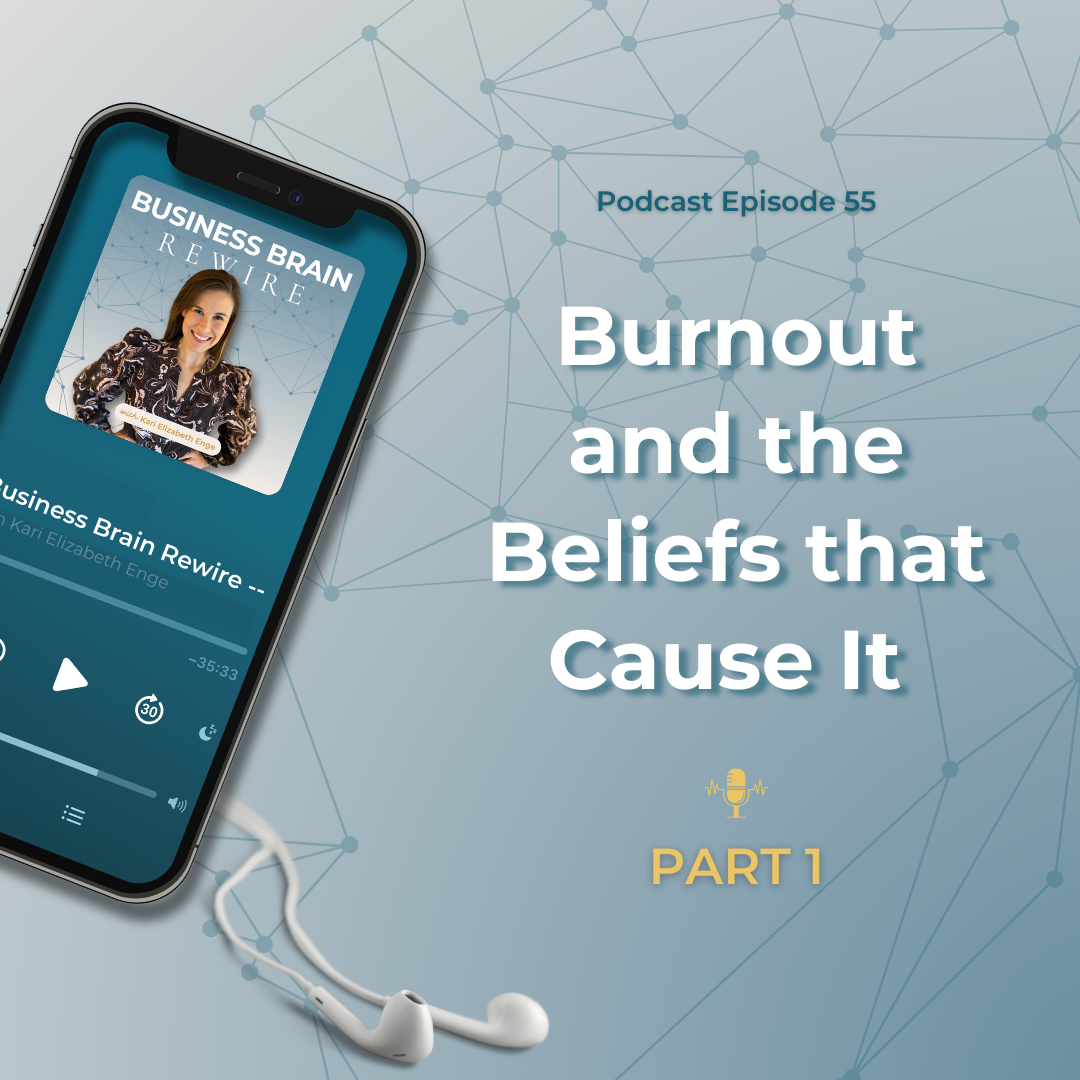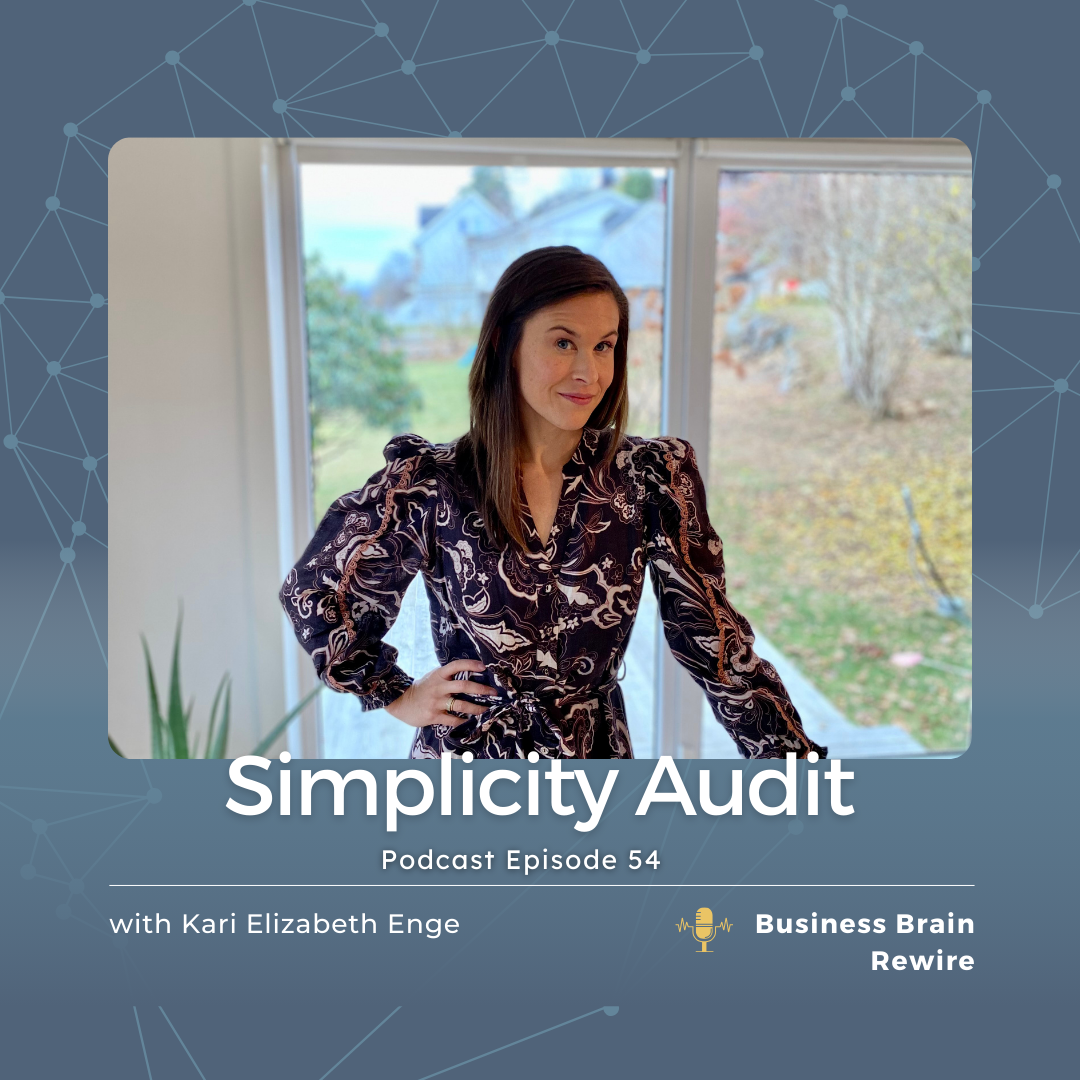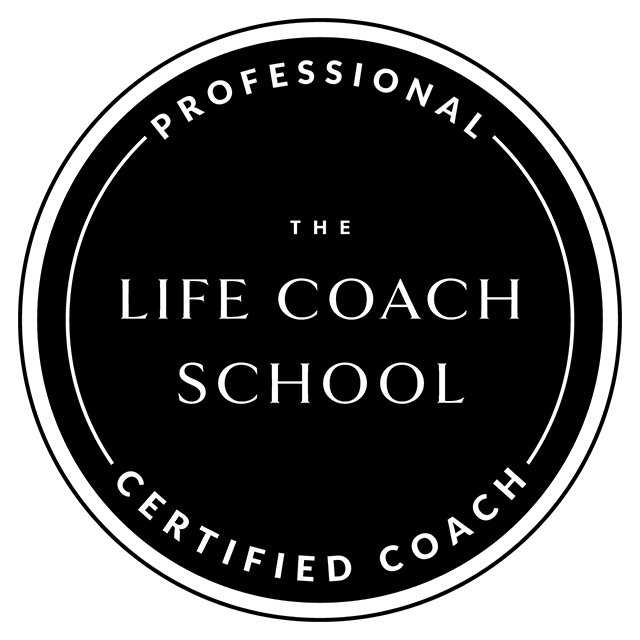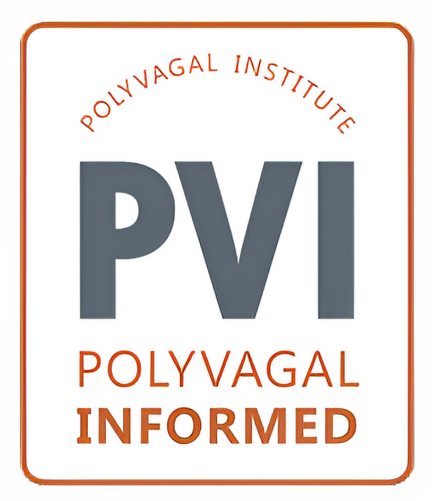If you’re a purpose-driven founder or leader, you already know—business isn’t just strategy. It’s the personal development work that builds real capacity so you can steer the ship forward with steadiness, not speed.
In this episode, we flip the script on traditional problem-solving and take a bold look at the real path to lasting, holistic success—one that supports your business, your nervous system, and your sense of purpose.
The truth?
It’s not about finding faster answers or getting it right. It’s about the deeper, slower work of becoming someone who can hold more—more pressure, more complexity, more influence—without losing your center or being pulled out of alignment.
Inner strength isn’t something you tick off your to-do list. It’s forged in the trenches—through hard conversations, emotional curveballs, and the invisible tug-of-war between your current habits and the leader you’re becoming. It’s the internal conflict between your old survival patterns and the new rhythm you’re trying to learn—like resisting the urge to overwork even when the pressure is mounting.
Through client stories, science-backed insight, and one vulnerable moment from my own parenting journey, you’ll discover a radical reframe: The very moments you want to skip might be the ones shaping your brain and your legacy.
Because here’s the truth: You don’t need another hack.
You need to learn how to stay.
To commit to the long game of personal growth is to embrace the discomfort of looking inward, to practice emotional skillsets that are intangible and often uncomfortable, and to find joy—not in arrival, but in the unfolding.
It’s not just personal development—it’s the real way to build a business that endures and a mission that ripples outward.
This episode is a guidepost for founders and leaders who are ready to stop rushing and start becoming.
In this episode, you’ll learn:
- A counterintuitive way to grow faster by slowing down and prioritizing personal development
- Why founders resist inner work—even when they admire leaders who embrace it
- How to tell when you’re “in the work” even if there’s no visible progress
If this episode had you nodding along, thinking yes, this is exactly what I need—then don’t stop here. Let’s take these strategies and turn them into action with a step-by-step framework. Proven science-backed tools. A clear path to growing with more impact AND ease.
Go to dobusinessbetterschool.com/join to learn more
Transcript
[00:01:34] I want you to start off this conversation thinking about some of the business outcomes that you wanna achieve this year. I know you’ve got some big hairy goals that you are working on, and maybe part of those goals involves or requires you to shift to becoming someone slightly different. Maybe you know you need to take more time off of work to prioritize your health. Maybe you want to be a more calm and grounded leader. Maybe you want to work on how you collaborate and communicate with your team. Whatever it is, becoming someone new or building a skillset as a leader is always a part of how you reach your goals. I think we all intuitively know this. Sometimes founders especially can forget this, and they think, you know, I just need to go out there and I need to find the right answers, and I need to solve this list of problems and I need to do it as quickly as possible. I just check things off the list. Check, check, check, check, check. And I run as fast as I can to check these things off the list. At the end of that, at the pot, at the end of the rainbow is success, or at least the next milestone. But that’s not how it works.
[00:02:58] I know that many of you who listen to this podcast have already kind of graduated from that mentality and you know that who you are being and how you are relating to yourself, your business, your team, and your goals is a big part of how you actually reach your goals. Really it has probably 90% of success lying right there because when you are being the person who is capable of holding and moving forward everything in a really calm, grounded place of strength, you know, you can figure anything out by just taking action in a really aligned, consistent way, keeping things simple, and bringing a network of collaborators and supporters and creative thinkers to the table to help you to solve any problem. But I think that something that gets everybody stuck, is that the human brain, no matter how much we know that this inner work of you know, who we are and how we’re being in our business. No matter how much we intellectually know that that’s important, the human brain always wants to get us distracted. It always wants to take us away from presence and how are we leading to the business and who we’re being to getting things. Right? This get mentality of I just need to find the right answers and do the right things in these slots on my calendar and check, check, check. Everything will be better.
[00:04:39] I think that there’s nothing wrong with us when this happens. I think it’s the human condition. So. I think it’s our lives work as leaders, as founders, to constantly be just bringing ourself back to the be mentality, to how we are interacting with our businesses internally, and then how that is projecting out onto the objectives and onto the goals. So I hope that no matter where you are in your inner work journey as a founder, that you are reminded today of how important it is to focus on who you are and how you’re relating to your business, and to make that a priority.
[00:05:27] The reason I wanted to push play today specifically, to talk to you about this topic is because of a little nuanced thing that happens when we are on our leadership journey. When we’re on our founder and CEO journey. When we’re trying to become someone different and we’re trying to reach goals along the way. There’s some little tiny thing that gets us caught back into the get mentality. It’s this idea that inner work is something that we do and we complete. It’s something that we check off, and then we just leave it to get on with the more important things on the table. It’s almost as if the only reason we’re doing inner work is because it is now suddenly starting to show that it’s blocking us from the next level of success.
[00:06:28] Right? Maybe we have a conflict with certain people in our lives, or maybe one of our investors or board members have told us that we need to work on something. Or maybe a spouse is saying, you know, this is really not working. The thing you’re doing here, you know, we need to make some adjustments. Or maybe it’s your health that has sort of been screaming to you that something needs to change and now you’re finally saying, okay, now I need to prioriti prioritize my health. Whatever it may be. I think it’s really important to just check in with ourselves to see if there’s a part of us that just wants to do, you know, inner work or leadership development, personal development on ourselves as just kind of a short term thing. Like, I’m just going to invest for six weeks and then I’m going to check that off and be done, because unfortunately it just doesn’t work that way. I was reminded of a personal story, when I was talking to the co client of mine today and I started sharing with her a little bit vulnerably about what we’re dealing with my daughter. My daughter is, a more sensitive girl and although we haven’t had a diagnosis of highly sensitive yet with her, we’re currently talking to a child psychologist around, okay, do we need to make some environmental changes or do we need to adjust our parenting style to support her better? Or do we need to give her some emotional tools to to regulate? So my husband and I, we had our first session with the psychologist yesterday. Like all great counselors, coaches, therapists, she asks us, okay, what do you wanna accomplish with these sessions? My husband, God bless him, you know, he’s just so wonderful. He says, well, I just want the tantrums to stop. Of course we want the tantrums to stop. What parent does not want their toddler or child’s emotional outbursts to stop. We would all love that. But his response really reminded me of how easy it is to fall into this get mentality rather than wanting to do the deep long-term inner work required to really understand our patterns and to really understand how we can interact with them in a way that brings a whole transformation to us and everyone around us, to deepen the relationships that we have.
[00:09:11] So not only to just, you know, change the behavior in this case, get rid of tantrums, but how do we use this process to be even stronger, to have even more rich, meaningful relationships with ourselves, with each other, as you know, her parents and with my daughter. How do we gift that to her as well? How do we use this challenging time that she’s going through to help her to come out even stronger and with a deeper sense of relationship with herself as well? This is what is on the table and available to us when we don’t try to just fix the problems and check the things off, and we are in it. For the long game. We know that life and the challenges that are presented to us are literally the point. They are literally the human playground for how we develop and enrich our experience and become who we were created to be.
[00:10:18] I think that is the point of our human existence. And the beautiful thing about it is that when we don’t rush through our becoming, when we don’t rush through our personal development and we make it one of the stars of the show, even if we are busy business owners, that it actually helps us because of what we know about neuroscience, it helps us to actually reach our business goals faster.
[00:10:47] So many founders, especially CEOs don’t wanna make time for the slow stuff, for the uncomfortable stuff, for, you know, the interpersonal things that take longer to accomplish because they think it’s a distraction and it will slow down business results. But it is just not true because we know about how the brain interacts interpersonally with other people and how it problem solves when it’s regulating and co-regulating with other people, we know that we are the most effective and creative and innovative when we’ve got that working in our favor. So playing the long game and being open to the continuous lifelong journey of developing yourself and learning new skill sets and doing deep inner work to uncover patterns and to shift into new ways of being. This is one of the biggest opportunities to bust through to the next level of income and impact and wellbeing and personal life. We just get to check all the boxes at the same time when we are willing to do that in a slow and intentional way. I would argue that it brings so much more fulfillment. So much more meaning and beauty into your work when you actually bring constant and continuous personal development, you know, into the party. It just has so many ripple effects that you can experience when you include that in your life.
[00:12:33] So I was talking to this client of mine and I was sharing this story with her. I was inviting her into, playing this long game and telling her that when we practice developing a new skillset or changing a pattern that we’re in, that we often say, okay, I’m willing that for this to take time. I’m willing to practice this for several months or several years, but then we go out and practice and we don’t get it. So we think that we’re doing it wrong. So I’ll give you an example. Let’s say that you really want to stick to a working calendar where you’re only working 30 hours a week. I know some of you are gonna say, oh my gosh, that’s not anything that’s too little. The number doesn’t matter, i’m just using a random arbitrary number just for the sake of the example. But let’s say you have this goal because of your health and because of your wellbeing and balance that you now want to work less hours and you wanna be more structured and organized about when you work. So you’re gonna practice keeping that boundary around your work. Then you start the week and you feel the chaos, and you feel the deadlines, and you feel the pressure, and you feel everything around you and the inertia of that. Really pressing up against this boundary and you’re like, you know what? It can’t be done today. It’s not a smart move. It’s not strategic, and you can’t keep the boundary. What I want you to consider is that when you actually use your toolkit to practice the inner work that is required to actually engage with that boundary, even if you don’t actually follow through with the action, you have done 90% of the work because there’s little, tiny, almost like muscles right inside of your brain and biology, little neuro pathways that are there. That are kind of grooves. Those grooves have been practiced over and over and over again so that you have a default way of working where you always just move the working hours when things get stressful. I think inertia is a really great word to use. It’s like there’s just some inertia in there because you’ve just, you know, you’ve just plowed down the road and you just keep on going down that road in your brain over and over and over again that it’s such a deep groove. It just chooses that almost automatically. So when you try to engage something different, you’re gonna feel a lot of resistance. You’re gonna feel resistance physically, emotionally, mentally. Your brain’s gonna tell you how unsmart it is. Your brain’s gonna tell you how sloppy it is and lazy it is, and how irresponsible it is. All of these things because it wants to go down the practiced neural pathway. So when you start to engage with the different physical, emotional, and mental patterns, even when you attempt to just check in to see what is causing you to currently keep that pattern, you do massive work inside of your brain, massive reconstruction. You are literally busting up and laying a new foundation for a new neural pathway, but that just doesn’t happen overnight.
[00:16:21] So that child psychologist, she literally said something really interesting because I was explaining how eruptive and intense these tantrums are with my daughter and how sometimes we can’t support her to come back into regulation, something that’s called completing the stress cycle, if you’re really nerdy with me. She kind of like bounces in and out of the emotion, but she doesn’t quite come back into balance and find her calm. We just bounce in and out of frustration and then she just distracts herself. So we were talking about how we can actually help her to learn how to fully regulate. So she reminded me of something she said: oh my goodness. What a wonderful thing that you are there in your presence for her while her brain is practicing and slowly developing those neural networks and it just, it caught me because I was in that get mentality of: okay, I’m doing all the right things on paper, right? I know how to regulate myself. I know how to practically regulate a toddler using the latest child development research and what we know about neuroscience. I am being calm for her and I’m co-regulating with her and I’m just holding space for her. Yet it’s not working and I just need it to work. Right? What I was forgetting, even though I work with this stuff all day long, every day with adults. What I was forgetting is that the work was not being shown on the outside and the progress wasn’t being shown on the outside, but we were still working the muscle. We were still making huge, massive shifts inside of my daughter’s brain in that very moment, even when she was tantruming.
[00:18:17] So we need to remember that when we are founder CEOs, leader, leaders, whatever we want to shift, whether that is building more confidence or learning how to set boundaries or, you know, getting over imposter syndrome or stopping procrastination or learning how to communicate better, meeting deadlines. I mean, you name it, there’s always a personal development goal that could and maybe should be on the table for us as leaders. When we are engaging with that, even when we are failing on the outside. Time, after time, the act of engaging with it is doing so much more work than we can even see. It is truly an inside job, and if we keep going and if we keep practicing and we keep cheering ourselves on, we give ourselves the opportunity to fully bring that neuroplastic change into existence. We complete it. So I think the best way to, to give ourselves a fighting chance to go on that journey is to realize that, going back to what I was saying at the beginning, this is the point of life. I know I talk a lot about business on this podcast, and yes, we wanna grow, you know, impactful, successful businesses. But the reason that we are on this planet is for our human experience and to reconnect with who we were created to be and to grow and develop ourselves. I truly do believe that. And business is a playground for that. It is the best playground for that because it’s just triggering in all the right places. I would argue that parenting is also a close tie to that. Both parenting, maybe marriage and business. They are the perfect playground for seeing who you were created to be and leaning more deeply into that. This is the point. So if we can remember that, we’re gonna stop trying to speed it up. We’re gonna stop trying to just get rid of the problem. We’re gonna stop trying to rush through and have someone just give us the shiny, bright answer, and instead we’re gonna just rest into the process and bring it back to, okay, how do I engage with this today? Okay. How do I practice with this today? Knowing that we will not see outwardly signs for a long time and that’s just gotta be something that we are okay with and that we are patient with.
[00:20:57] What I think is really important when you start doing personal development work is that you start by really tuning in with how you’re feeling and what’s going on for you. Because that creates a safe base for you to do really, really hard things and to love yourself through the process. Literally, parenting has the same application. So if you are educated in the latest developmental research, or you follow conscious parenting, you’ll know this, right? That a big part of developing your child is being a safe place for them and being a safe base for them emotionally so that they have a strong foundation so that they can then go out in the world and play and discover and create. Business owners are the same, so our CEOs and leaders. We have to have a safe, emotional base so that creativity, innovation, collaboration, and teamwork can then occur. So as adults, that safe base is something that we have to create and nurture for ourselves. We don’t have, you know, an adult figure in our life that is providing that to us. Right? Of course, we can have a partner, we can have faith and all of those things that are tools in our toolkit, but we have to take responsibility for saying, okay, I’m going to lean on things to create a safe base for myself. There isn’t, there isn’t a level of responsibility that occurs where you say, okay, let’s do this. I’m gonna do this for myself. So it’s important to, to recognize that providing a safe base for yourself is the first and foremost step with becoming anything new because think about it from a parenting perspective for a second. Even if you don’t have a child, you can just think about this logically. Let’s say that you want to teach a young child how to play the piano. In order to teach a child how to play the piano, you need to make it safe and fun, and you have to help them enjoy the process. You have to get them tapped into intrinsic motivation to go on the journey of failure and to engage with it over and over and over again. Unless that’s emotionally safe for them, they’re not going to be able to enjoy it enough to do it long term and to master it. So we are the same if we want to become a more calm, grounded, regulated, you know, founder or leader, if we want to be more confident speaking up or selling whatever the goal is, we have to create a safe, emotional base for our ourselves to interact with it and to fail at it, and to have fun with it. It and to be able to do it over and over and over again in order to master it. So many leaders are just not willing to develop their capacity to be a safe base for themselves. They get stuck there because they don’t actually know that that is the first step of all inner work, all personal and professional development. Think about it. If you want to be a more inspiring, collaborative leader who builds an amazing work culture, and yet your inner culture is not supportive of you failing and trying and playing the long game on something before you beat yourself up, then that bigger goal of doing that for other people is never gonna happen.
[00:24:49] Today I want to just leave you with that, that as we go out and we try to develop ourselves and to become better versions of ourselves as founders and leaders. We know it’s gonna be a long process. We know that this journey of self-development is kind of something that’s gonna be ongoing. How do we start with that? How do we start with treating ourselves as if we were little children? Loving on ourselves and creating that emotionally safe space for ourselves so that we can practice and fail and try new things over and over and over again, even when we don’t see things shifting on the outside. We trust the process and we know that all those little neurons are firing and connecting and wiring together to help us to see that change further down the road, we can truly become unshakeable. So resilient, so strong. We literally can transform into someone new many, many times in our lifetimes and our goals can just follow us at each step of the way where we just expand and expand and expand, but we have to be willing to be that safe space and that is an inside job.
[00:26:14] Thanks for listening to this episode of Business Brain Rewire. If you wanna learn more about my work, come visit me at do business better school.com. See you next week.
Podcast: Play in new window | Download
